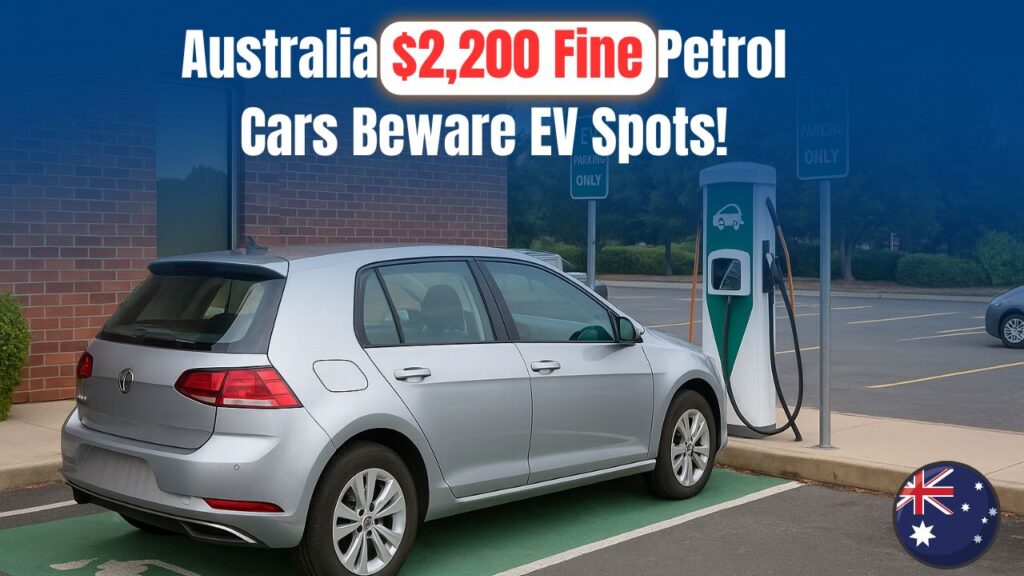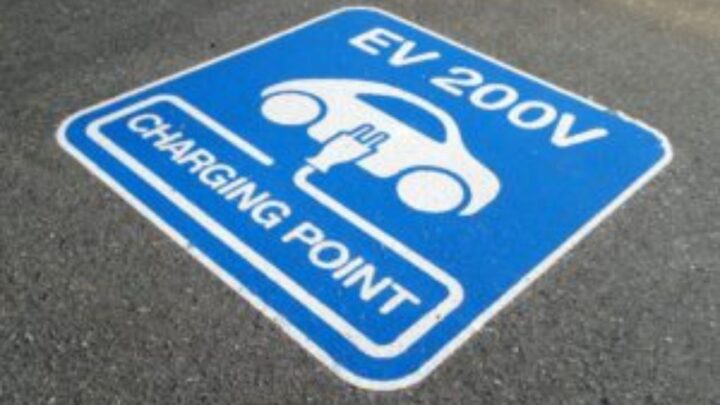Australia has introduced strict new parking penalties in 2025 to promote cleaner transportation and ensure fair use of electric vehicle (EV) infrastructure. Under the updated rules, petrol and diesel vehicle owners who park in EV-only charging spots can now face fines of up to $2,200. This move comes as part of the government’s broader plan to accelerate EV adoption and discourage misuse of dedicated charging bays. Authorities believe the new fine structure will protect EV drivers’ rights and encourage motorists to respect sustainability-driven parking rules across Australia.

Understanding Australia’s $2,200 EV Parking Fine – Why It Was Introduced
The Australian government introduced the $2,200 fine to address a growing issue—non-electric vehicles occupying EV charging bays, preventing EV owners from charging their cars. With the rapid increase in EV ownership, the government aims to ensure that charging infrastructure remains accessible to those who need it.
- Encourages compliance with EV-only parking rules.
- Protects access to limited public charging spaces.
- Supports Australia’s 2030 Net Zero target.
This fine is part of a wider sustainability effort and aligns with the Transport Ministry’s mission to reduce emissions and promote greener alternatives for everyday commuting.
How the New EV-Only Parking Rules Work in Australia
Starting in 2025, all EV-only parking spots will have clearer signage, painted symbols, and visible warnings indicating “EV Charging Only.” Parking inspectors and local councils have been authorized to issue immediate fines to petrol or diesel vehicles found in these zones.
- Fines up to $2,200 apply for first-time offenders.
- Repeat violations may result in towing or license suspension.
- Private properties and shopping centers must also comply with signage rules.
Drivers are urged to stay aware of new parking layouts in cities like Sydney, Melbourne, and Brisbane, where enforcement has already begun with on-site monitoring and cameras.
Insurance and License Risks Linked to EV Parking Violations
Aside from financial penalties, violating EV-only parking rules could impact a driver’s insurance record and license points. Insurers may consider repeated violations as reckless behavior, leading to higher premiums. Local transport authorities have also warned that serious repeat offenders could face temporary license suspensions.
- Insurance companies may flag persistent offenders.
- License demerits could be added depending on jurisdiction.
- Data sharing between councils and insurers enhances enforcement.
This emphasizes the importance of understanding parking signage and complying with evolving eco-friendly laws that support electric mobility in Australia.

Future of EV Infrastructure and Public Awareness Campaigns
Australia plans to double the number of EV charging stations by 2026, and awareness campaigns will continue to educate motorists about responsible use of EV zones. The $2,200 fine serves as a strong deterrent while symbolizing a national shift toward sustainable urban mobility. Experts believe this initiative will make Australia a global example of EV regulation and infrastructure discipline.
- Expansion of national EV charger networks.
- Public campaigns for cleaner mobility awareness.
- Integration of smart parking technologies.
| Aspect | Details |
|---|---|
| Fine Amount | Up to $2,200 AUD |
| Applies To | Petrol and Diesel Vehicles in EV-only spots |
| Enforcement Start Date | 2025 |
| Responsible Authority | Australian Transport and Local Councils |
| Additional Penalties | Towing, License Demerit Points, Insurance Risks |
| Objective | Protect EV Charging Infrastructure and Encourage Green Mobility |
FAQs
Q1: What is the fine for parking a petrol car in an EV spot in Australia?
A: The fine can go up to $2,200 AUD.
Q2: When did the new EV parking fine start in Australia?
A: It began in early 2025 under the new traffic rules.
Q3: Can repeated offenders lose their license?
A: Yes, repeat offenders may face suspension or demerit points.
Q4: Are these rules valid on private property?
A: Yes, private and commercial properties with EV chargers must also comply.





